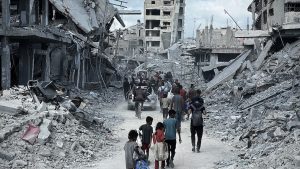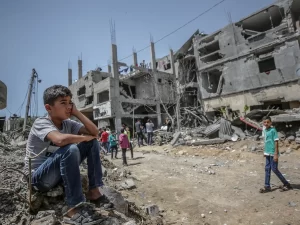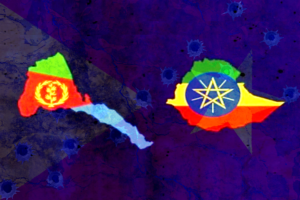Gaza’s Fragile Ceasefire Tested as UN Urges Israel to Open Crossings: Aid, Anger and Uncertainty
The uneasy calm between Israel and Hamas is fraying, strained by the emotional and political fallout over the delayed return of deceased hostages’ bodies. What began as a humanitarian ceasefire has morphed into a tense standoff. A situation that is now threatening both aid flows and fragile hopes for peace.

In Gaza, families queue anxiously outside bakeries and markets, stockpiling what little food they can afford. Prices are soaring, traders are hoarding and whispers of renewed fighting hang heavy in the air. Some displaced people Khan Younis don’t trust the ceasefire. They believe they should be prepping for the worst.
The United Nations’ humanitarian chief has urged Israel to open more crossings into Gaza, warning that restricted access could worsen the already dire humanitarian crisis. The appeal came as Israel threatened to limit supplies over Hamas’s failure to meet a Monday deadline to return the remains of 28 deceased hostages.
Hamas in turn claims it cannot locate all the bodies amid the devastation. Seven have been returned, with two more promised. But the Israel Defense Forces reported that one of four bodies received overnight did not match any of the hostages. This is a development extending the grief and anger among Israeli families. Some of the Israeli relatives of the missing persons feel they are playing games with their loved ones.
Under the delicate agreement, Israel has returned 45 Palestinian bodies, 15 for each deceased Israeli hostage, bringing the total to 90. Yet with the key Rafah crossing between Egypt and southern Gaza closed, aid convoys remain stranded and humanitarian groups warn of imminent shortages.

Meanwhile, Gaza is reeling from reports that masked Hamas gunmen executed eight Palestinians accused of collaborating with Israel. The acts that have sparked outrage and fear. The US Central Command urged Hamas to cease violence against civilians and commit to the peace framework.
Diplomats from Egypt, Qatar and the UN are scrambling to keep the ceasefire alive. But as the political maneuvering continues in faraway conference rooms, the human toll is felt most acutely in Gaza’s darkened homes, where families cling to fragile hope in the middle of hunger, grief and the constant dread of war’s return.







